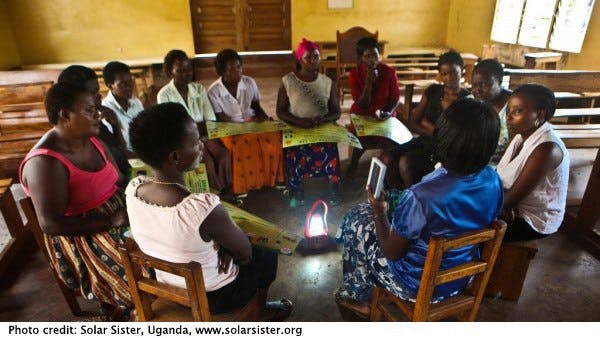
Yesterday, the United Nations Foundation joined an event hosted by the Obama Administration on increasing access to off-grid clean energy technologies. It may seem a wonky topic, but it has enormous global human impact.
Energy does so much more than turn on lights and power machines – it transforms lives.
Children can study at night; small business owners can keep their stores open longer, increasing their incomes; women don’t have to deliver their babies in the dark; industries can grow and create jobs; and people around the world can connect to information and each other through digital technologies.
Yet worldwide, more than 1.1 billion people don’t have access to electricity, and a billion more depend on very unreliable power.
In September, world leaders gathered at the United Nations to adopt the Sustainable Development Goals, a shared agenda to create a world where no one lives in poverty and everyone lives with dignity and opportunity. Achieving the global goals will require expanding access to energy in ways that don’t contribute to climate change, which is already threatening to undo our gains against poverty. For the first time, energy has been recognized for its critical role as an enabler to all sorts of improvements in people’s lives.
And the good news is that affordable clean energy technologies already exist that provide power to people who need it most, while protecting the environment.
In 2011, United Nations Secretary-General Ban Ki-moon launched the Sustainable Energy for All initiative with three global objectives for 2030:
- Ensuring universal access to modern energy services;
- Doubling the rate of improvement in energy efficiency; and
- Doubling the share of renewable energy in the global-energy mix.
Since its launch, Sustainable Energy for All has catalyzed action from governments, businesses, entrepreneurs, non-governmental groups, and many other partners to advance clean energy solutions.
Yesterday, in support of Sustainable Energy for All, the United Nations Foundation announced a commitment to harness sustainable energy to improve health care. With support from the United Kingdom’s Department for International Development, we are working on an initiative to deliver sustainable power solutions to health facilities in sub-Saharan Africa.
The focus of this work is on improving the accessibility, quality, and safety of essential health services – with a particular focus on addressing the needs of women and children – through the holistic and sustainable electrification of health care facilities.
With an initial plan to provide electricity to 80 facilities with decentralized renewable energy, the initiative is expected to support more than 1,000 health care workers, serving nearly 1.4 million people, and will improve health care service delivery affecting approximately 500,000 outpatient visits annually.
Lionel Zinsou, Prime Minister of Benin, who attended yesterday’s forum to announce his country’s commitment to a new “Lumière pour tous” or Light for All initiative bringing electricity to the 80% of the population still not benefiting from modern energy, explained that without electricity in a health facility, “You’d better have surgery before sunset” and not “have any pregnancy complications” due to the challenge of providing health services without reliable power.
This is an example of how the UN is spurring action to transform lives – and it’s an example of how sustainable energy is key to sustainable development.
To learn more about all of the commitments made at yesterday’s event, read this press release from the White House. And to learn more about the UN Foundation’s work on energy access, visit energyaccess.org.



 View All Blog Posts
View All Blog Posts